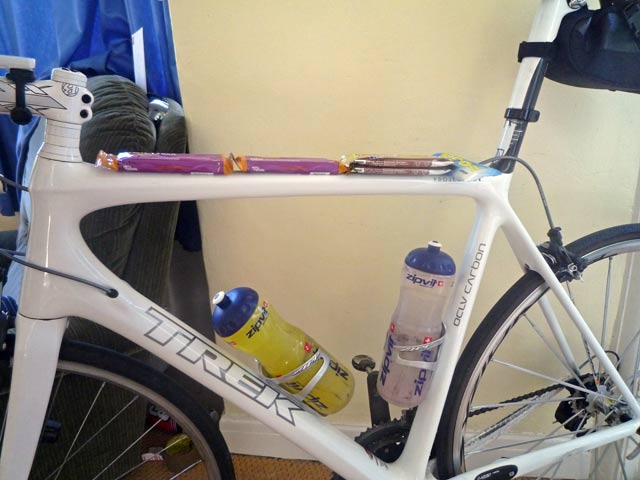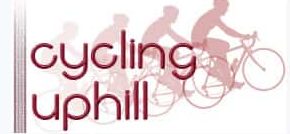For a long ride of 3-4 hours +, it is worth making some preparations and calcuations about how much energy to try and take on.
Carbo-loading
- For anything of 100 mile plus, I will eat more carbs in the day or two before. For example, if I go out for a 1-2 hour ‘warm-up ride’ Normally I wouldn’t take any energy drink or food. But, in this case I would take a 750ml energy drink, to take on more carbs than usual.
- I haven’t researched carbo-loading enough, but you have to be careful not to place undo stress on stomach by eating much more than usual.
- It is also important to be well hydrated the day before and for the morning of the race.

Carbohydrate consumption
- The first issue is what is the maximum amount of carbohydrate that the body can absorb per hour?
- The most common figure I have seen is 60 grams of carbohydrate.
- However, recently, energy drinks manufacturers have cited research that if you take a mixture of maltodextrin and fructose, you can take up to 80-90 grams. Increasingly energy drinks have maltodextrin and fructose in the ratio of 2:1. But, high quantities of fructose can be problematic for the stomach, you would have to test on yourself to see your tolerance.
Four hour ride
For a four hour ride, you could take a rough target of 70-80 grams per hour. Making a total of 280-320 grams of carbohydrate.
This could be made up of
1.5 litres of energy drink + 5 gels
- 1.5 litres of energy drink – 132 grams
- 5 * Energy gels (@27grams) – 135 grams
- Total = 277 grams = 70 grams per hour
3.0 litres of energydrink + 1 gel
- 3.0 litres of energy drink – (264 grams)
- 1 * energry gel (@27grams) – 27 grams
- Total = 301 grams = 75 grams per hour
Energy / carbohydrate per bottle
- Using, for example, High 5 Energy powder a 500ml of energy drink gives 44 grams of carb.
- I use 750 ml bottles, so per bottle I have 66 grams of carbohydrate.
- Note: This is four scoops of energy powder and relatively strong.
Bottles per ride
- For a four hour ride. If you drank 4*750ml (3 litres) or 6*500ml, you would get your lower limit of 66 grams per hour.
- However, 3 litres is a lot to drink during a four ride. Unless it is really quite hot – over 25 degrees, you are unlikely to get through anything like 3 litres. If you do drink 3 litres in a four hour period, you will probably have to stop for a natural break or even feel a little bloated.
- Personally, I find for a four hour ride, 1.5 litres is a more manageable consumption (at average UK summer temperatures of less than 20 degrees)
- This means, I am getting half carbohydrate from energy drinks. – 132 grams, leaving a potential 150-18 grams I could absorb.
Energy gels
Most energy gels give around 20 – 25 grams of carbohydrate.
- For example, I use some SIS isotonic gels. These give around 22 grams per gel. But are relatively more bulky
- A powerbar gel, gives 27 grams of carbohydrate, it needs to be taken with water.
If you drink 375ml of energy drink in an hour – 33 grams, you could have a powerbar gel of 27 grams to make up 60 grams.
Rules of thumb
- If you drink 400ml per hour. Take one energy gel (unit of around 25 grams too)
- If you take 750ml of energy drink, you don’t need many energy gels.
Theory and practise
- The interesting thing about working out all this out, is that I don’t think in a 100 mile time trial I’ve got close to reaching the upper end.
- Nearly always I end up taking less energy gels than I carry. For example, last Sat I drink about 1.3 litres and took 1.5 energy gels.
- The total energy consumption was around 110grams + 40 grams = 150grams. Much less than theoretical limit of 280 grams
- This has happened for every 100 mile TT I have done.
Would you go faster to take on more carbohydrate?
I don’t know the answer to this.
- The body can store roughly around 400 grams before a race.
- When racing long distance time trials, you will also be using fat-burning energy stores.
My gut feeling is that if I had doubled my carbohydrate intake during last 100 mile TT, it wouldn’t have made me much faster. But, I don’t know the answer. I don’t think there are many riders taking on 300grams of carb in a 100 mile TT
The problem is that when racing at quite a high intensity, you often don’t feel like taking another gel because
- It is awkward to open and eat
- You don’t feel hungry. The stomach may already be stressed.
For six hour plus rides
The longer the ride is the more important it is to consider long-term energy needs. For a 3-4 hour ride, you can survive to a large extent on fat reserves and existing carbohydrate reserves in the body so maybe the above calculations are not so important for 3-4 hour rides. But, as you go longer, it becomes more beneficial to try and maximise carbohydrate intake to provide additional energy to the fat burning reserves.
Also, for longer rides, it is at a progressively lower intensity, so it is easier to eat on the move.
Part of motivation for this post is to think about energy needs for a 12 hour time trials. I imagine, from experience of doing 100 mile TT, it requires a certain discipline to take one energy gel / bar per hour. It may seem really easy to take one energy gel per hour, but when you start racing, it can be surprisingly easy to delay taking it.
Weather and body types
These kinds of calculations depend on quite a few variables
- Temperature and humidity. I always check temperature and use it to calculate expected water requirements. I know 20 degrees, requires very different levels to 12 degrees.
- Body type. I am the body type, which feels the cold during mid-summer. Others can sweat profusely when it gets above freezing.
- There isn’t a direct proportion. For a 5o mile TT, you may be OK on a 500ml water bottle – you could even get away without water, if you really wanted. But, if you go to 100 mile TT, that doesn’t mean 1 litre will be correct. For the 50, you are also using reserves. If 500ml works for 50 miles, you may need 1,500ml for 100 miles.
- Can energy drinks be absorbed. Some people struggle to consume high amounts of sugar because the stomach is less flexible. It is often repeated advice – always test energy consumption on training rides. It is very tempting to not use energy gels and drinks on training rides, so in a race/ big ride, you are doing something your body has never had to deal with before.
Over-consumption
In an effort to take on more carbohydrates, you can over-consume. In my case I haven’t eaten too much, but drank too much. I remember one hundred mile race, where I worked out max. carb consumption and I decided to drink 2.25 litres (3 big bottles) + 2 energy gels. I also drank quite a bit before. The problem was it was really cold, and all that water just slushed around the stomach and then I had to make two undignified dashes into some well hidden bushes.
If you take on a lot of plain water, when it is hot, that can cause problems because of lack of electrolytes.
Related
